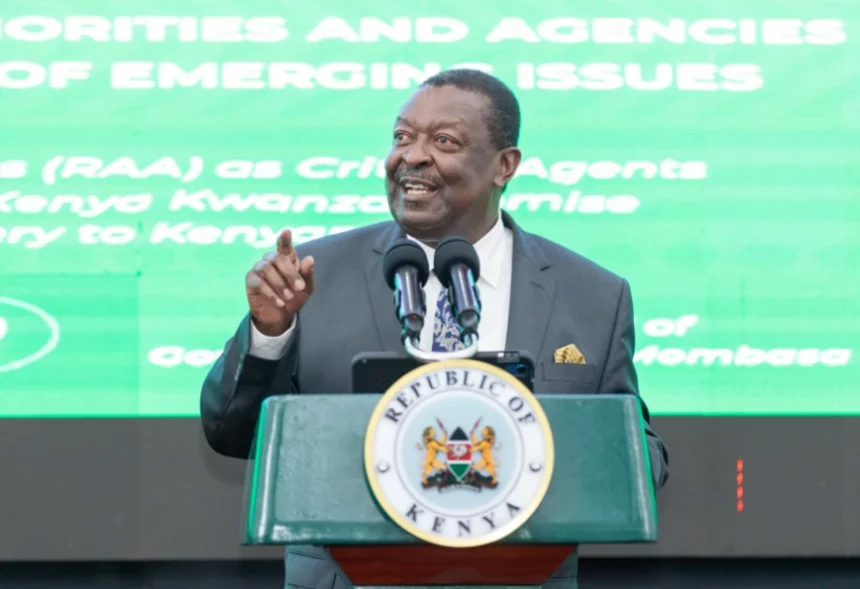Regulatory Authorities and Agencies (RAAs) have been warned of severe consequences if found engaging in corruption and rent seeking at the expense of delivering services to citizens.
Prime Cabinet Secretary Musalia Mudavadi has said all regulatory authorities and agencies must establish corruption prevention committees and mean business in the fight against corruption and the prudent utilization of public resources.
Mudavadi made reference to the Ethics and Anti-Corruption Commission’s National Ethics and Corruption Survey 2023, saying it provides a template on the common weaknesses and loopholes in Ministries, State Departments and Agencies.
“I challenge all the Regulatory Authorities and Agencies to also institute measures geared towards wiping our avenues for corruption in line with the lessons contained in the EACC report and template,” he said.
“RAAs must not be dens of corruption or rent-seeking, they must carry out their core mandates effectively and in the national interest.”
Mudavadi, who doubles as Foreign and Diaspora Affairs Cabinet Secretary, said there is also an urgent need to address the issue of regulatory overlaps and duplication.
This, he said, is a real problem for which a solution must be found soonest.
He noted that in addition to the complexities posed by varying regulations at the county level, enterprises across the nation are confronted with a maze of conditions, requirements, fees, charges, and levies imposed by multiple government agencies and regulatory bodies.
“Tough decisions will have to be taken to give effect to the merging of certain regulators. for instance, the manufacturing sector, where institutions such as the Kenya Bureau of Standards (KEBS), the National Environment Management Authority (NEMA), and the Departments of Weights and Measures all assert their authority over aspects such as labelling and inspection,” he noted.
“This overlapping mandate often leads to confusion and inefficiencies for businesses striving to comply with regulatory requirements.”
The Prime CS also gave a series of other examples that include the challenges in the food and beverage processing industry, the financial sector where there exists an overlap among regulatory bodies like the Capital Markets Authority (CMA), the Insurance Regulatory Authority (IRA), and the Sacco Societies Regulatory Authority (SASRA).
“Consolidating their functions under a unified framework would undoubtedly enhance their collective impact and streamline regulatory processes.” said Mudavadi.
In the realm of intellectual property protection, Mudavadi in his remarks pointed out that agencies such as the Kenya Industrial Property Institute (KIPI), the Kenya Copyright Board, and the Anti-Counterfeiting Agency all play distinct yet interconnected roles.
“By harnessing their expertise within a consolidated framework, we can eliminate redundancies and foster a more efficient system for safeguarding intellectual property rights,” he stated.
In the aviation sector, the Prime CS said while the Kenya Civil Aviation Authority (KCAA) is responsible for overseeing various aspects of civil aviation, including safety oversight, air navigation services, and aircraft registration, within the same domain other entities such as the Kenya Airports Authority (KAA) and the State Department of Transport also hold significant regulatory roles.
He noted that while KCAA focuses on safety and regulatory compliance, KAA manages airport infrastructure and operations, where there is often a duplication of efforts and conflicting directives.
“The examples above are not exhaustive and they are by no means the only instances where there are actual and perceived overlaps,” added Mudavadi.
“These examples are provided so that we can start a conversation on enhancing the efficiency and effectiveness of our RAAs and, in doing so, ease the burden on the exchequer and make it easier to conduct business in Kenya, not just for our citizens, but for foreign investors.”
He said to steer the country towards the much-anticipated prosperity and progress, focus has to shift from mere policy directives to real action.
The Prime Cabinet Secretary made the remarks during the interactive and consultative conference to assess the status of the ongoing campaign to revitalise and re-energise regulatory authorities and agencies happening at the Kenya School of Government in Mombasa County.
“It is imperative that we engage in candid self-assessment. Are we truly maximizing our potential? Are the practices of RAAs aligned with the national interest? We cannot ignore the possibility that some regulatory practices may inadvertently impede business activities.” he noted.
Mudavadi acknowledged that the World Bank maintains an Ease of Doing Business Index, which Kenya has been steadily rising in.
He said focus must now shift from policy directives to action that emphasizes on progressive change of livelihoods for Kenyans.
“You will not be surprised to note that some of the key measures implemented which allowed Kenya to make business easier was getting rid of certain fees and bureaucratic regulatory processes, many of which had existed from the 1980s and 1990s.” he stated.
“Upon examination, it was discovered that regulators often imposed fees, even nominal ones as low as Ksh.1,000, for issuing certificates, often merely as a procedural formality. However, the administrative expenses incurred in collecting such amounts, including maintaining infrastructure and staff, sometimes surpass the total revenue collected. It is evident that this scenario is not unique and likely extends across numerous regulatory agencies.”
Mudavadi said as government agencies including the regulatory bodies, it is the time to re-look and reflect internally, and effect the reforms that will help steer the country forward.
“Just imagine 7 years people by design trying to make sure an entity of government is rendered dysfunctional deliberately. As a regulator if you go into your archives, how long have you taken to dispense with the decision that is required so that a business decision can be made one way or another, have you had it for 7 years, 5 years, 3 months or what?” he raised the concern to the Chairpersons and Chief Executive Officers of regulatory authorities and agencies, directing that all CEO.s should now chair corruption committees in their respective RAAs.
“The headlines we are seeing are not good for the country; it has become awkward, when some key development partners are citing this as the issue that is obstructing the very strategic agreements that we want to enter into. We need to look into this area effectively.” noted Mudavadi.
He emphasized that RAAs must consider the ramifications of their actions and procedures on the economy and the ease of conducting business, noting that in today’s global landscape, efficiency and economic competitiveness are paramount.



